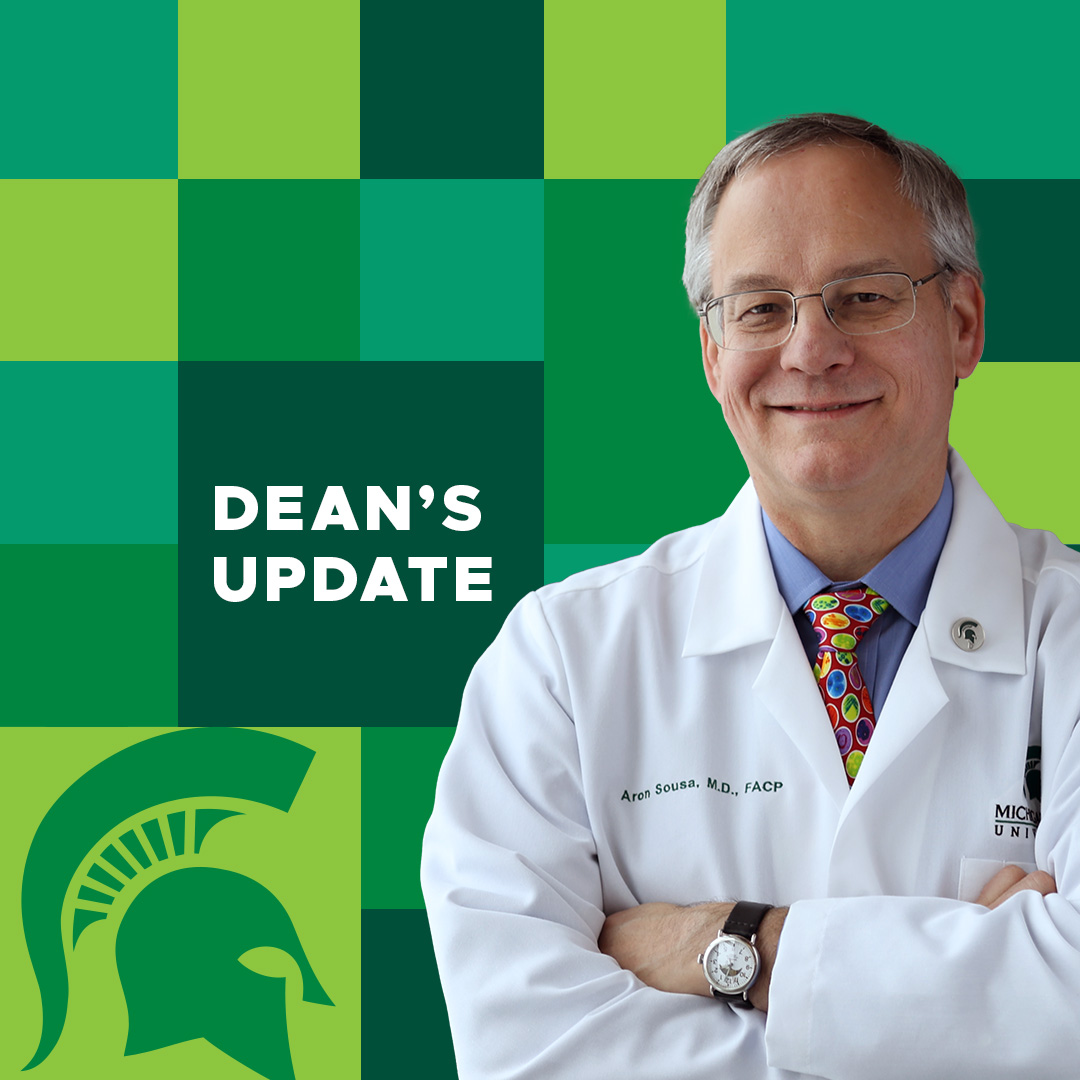Dean's Update
May 23, 2025 - Aron Sousa, MD
 Friends,
Friends,
I ask you to check out our recent story about the termination of an NIH grant led by Dawn Misra, PhD, chair of the Department of Epidemiology and Biostatistics. Her work investigated epigenetics, race, and birth outcomes. Epigenetics is the study of how our DNA is modified over the course of our lives. Some of these changes are alterations in support proteins that manage and present DNA for transcription, while other changes, like methylation, are small chemical modifications that do not change the base pairs but could inhibit transcription of the DNA on the path to building proteins.
According to the CDC, race and ethnicity are “factors associated with preterm birth” (accessed May 21, 2025) with the highest risk for Black, Native American/Hawaiian/Pacific Islander families. Research suggests this disparity is rooted in the lived experiences of Black women, which may shape the epigenetic changes and essentially make cells age prematurely. This acceleration of cellular aging may influence health risks for Black mothers and their infants. The question of how life course exposures shape the mother’s own epigenetic changes and her pregnancy health have not been well studied.
So, Misra’s LIFE-2 Study is a groundbreaking, NIH, peer-reviewed study examining how the lifelong social environment of Black women in Michigan affects the maternal epigenome (including biological aging) and preterm birth. This population has been understudied by science, and it is good scientific practice to study populations that have a high burden of disease – that’s how you get meaningful data. This is particularly true for conditions like pre-term birth, which drives many of the health risks of babies. Grants like Dawn’s are a part of saving the lives and health of moms and babies. The NIH terminated the grant not as a part of a meritocracy, but rather because the study looked at race as a variable in preterm birth. Importantly, the study already has 600 women enrolled and has samples in storage. At the college we are doing our best to help rescue the science.
We still have a large number of grants in limbo. And, we have some projects for which we know there is funding, but there is no one in the federal unit to answer the phone. We have begun to notify those staff and faculty that layoffs are possible if funding is not released by the federal government, which is painful for all involved. Our human resources team is meeting with the affected people in the hopes we help them find other positions. This is important and difficult work.
The college faces a 9% cut in our general funds from the university over the next two years, and we know the 13% of our budget related to Medicaid is still very much at risk. It is a hopeful sign that existing Medicaid State Directed Payments are grandfathered into the budget the House approved Wednesday. But, these payments are currently held up in the federal government, so Congress could approve the money but the funds might not flow to hospitals and providers. I refer you back to the previous paragraph.
We have very little time before our first set of cuts are due to the university on June 6, but we do have time to make other changes over the course of the year. I have arranged an anonymous Qualtrics survey to collect your ideas on how we can maintain our strengths and mission. The prompts are: 1) your ideas for improving efficiency and synergy within and between units, and 2) the most important functions/activities for the college to preserve. Please find the survey here.
I assure you, we do fun work too. Graduation was a couple of weeks ago, and the college allows/encourages graduates to take their children with them as they walk across the stage for their hooding. Our communications team created a TikTok video of these graduates and their kids. The video went viral. The comments were positive and delightful – it’s a cleanse to our current atmospheric pong. We have so many happy stories, like those student families, as we share our good work across the state. Check out these stories of our MPH and MD graduates. Enjoy!
Serving the people with you,Aron
Aron Sousa, MD, FACP
Dean, Michigan State University College of Human Medicine

